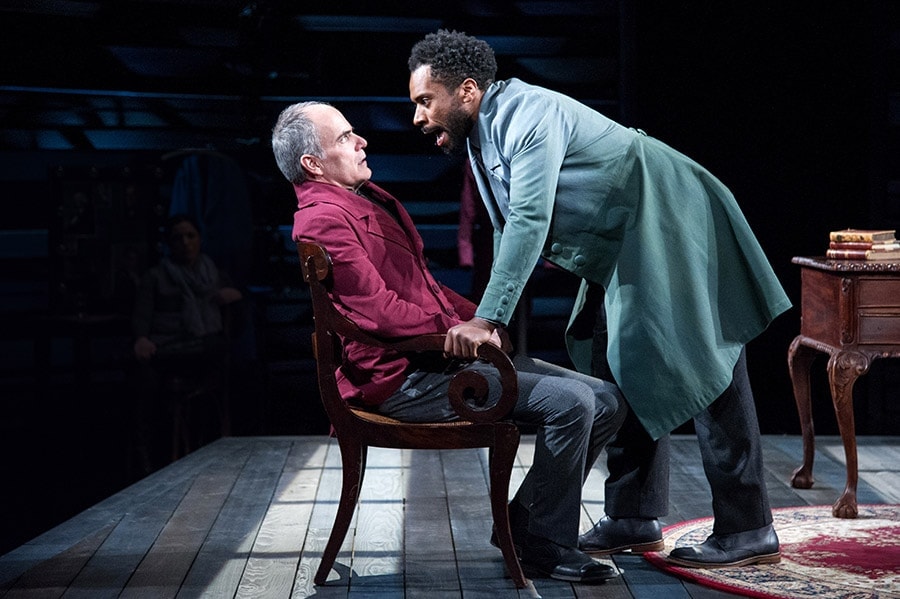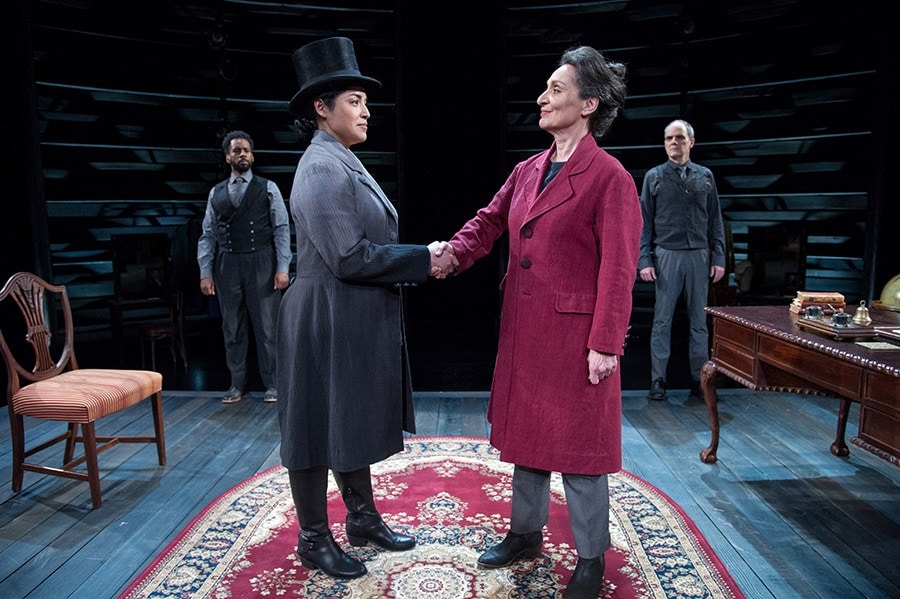Leaving Arena Stage’s world premiere of JQA, the fictionalized account of John Quincy Adams as imagined by playwright/director Aaron Posner, I’m feeling this: Adams was a sour, stiff-necked, rigid man born of privilege. My God, what a damn, pain-in-the-ass, dry, overly-refined know-it-all; even if his values seem on the surface to be more progressive then not.

What JQA does well is to challenge a viewer to rethink what happened more than 150 years after John Quincy Adams died that still reverberates around America today. Think of the American government as an institution or how citizens see the world through their own privileged rose colored glasses or through a lens that may be very dark indeed.
As Posner writes in his Arena JQA program notes, the play is not meant to be historically accurate. Rather, it is “an attempt to look at today through the lens of yesterday.” Posner’s John Quincy Adams is written as a brittle man. A person of great intellect with much surface success yet with feet of clay on issues such as abolishing slavery. He also has major shortcomings as a father and husband.
When the fictional, whip-smart John Quincy Adams is engaged in theatrically intense verbal conflicts with key figures in his staged life he often comes out the lesser. The imagined debates include ones with his mother, Abigail Adams (What kind of son is he?), his wife Louisa Adams (What kind of husband and father is he?), Andrew Jackson (What role do charismatic figures play in national government?), Frederick Douglass (What can Adams do to abolish of slavery?) and Henry Clay (Is political compromise a bad thing?).
The four-member JQA cast is terrific. Rather than becoming bogged down into the dialogue or becoming ghosts on stage, each gives off distinct personalities with sparks of energy. The four are Jacqueline Correa, Eric Hissom, Phyllis Kay and Joshua David Robinson.
Each of the four has the opportunity to portray John Quincy Adams (1767-1848) at different times in his long life from early childhood through the last years of his life.
Each also portrays other key characters as well. Joshua David Robinson is utterly riveting in his role as that charismatic man of the South and the working class, Andrew Jackson. Not long after, the same actor becomes escaped-slave and magnetic abolitionist Frederick Douglas.
Eric Hissom is all boisterous good fun as the drunk Secretary of State Henry Clay; a “right-on-the-money” politico ruled by the notion that compromise is not a bad thing if one wants to get things accomplished.

Phyliss Kay gives off an aura of absolute control in her portrayal of Abigail Adams, the Adams family matriarch nearing her death. Jacqueline Correa and Kay both portray Louisa Adams, JQA’s long-suffering wife at different times in her frustrating, death-impacted life with her husband. Both lay bare the shocking shortcomings of John Quincy Adams as a husband and father. They do so not with shouts but with quiet moral insight and authority,
The JQA creative team uses the Arena Kogod Cradle to advantage with a minimalist set design by Meghan Raham. Set pieces are carted into and out of audience view, while four theatrically lit dressing tables remain in the shadows. There are four front-and-center mannequins that play a key role. Helen Huang’s costume design is a spiffy one especially with one major piece of attire; salmon pink frock coats of different sizes and styles. The frock coats take on their own lives throughout the JQA production. Be ever watchful of the frock coats and their clout. Jesse Belsky’s lighting grid adds nicely to scene highlighting
JQA as part of Arena Stage’s Power Plays Initiative exploring politics and power. Any number of Posner’s lines of dialogue sound as if there is a political/cultural foot in early-mid 19th century America and a political/cultural foot in the now of early 21st century America.
Throughout JQA, there were more than mere whiffs of how early days impact current days. There are general lines of dialogue aimed at those of white privilege living lives of smug assurance, never coming into contact with working-class folk. Or lines asking how it would feel if a well-off white person woke up one morning to be reborn a slave living on a southern plantation. Or one line that might recall Adlai Stevenson’s inability to win a national election when he was dismissed as an “egg-head.”
One line of Posner’s script has stayed with me more than others. It was not one about the national government doing good things, or about being a good person. No, it was this one; “John Quincy Adams, you reek of integrity.” Poor John Quincy Adams was left to hang out to dry, sure.
Running time: Approximately 1 hour and 30 minutes with no intermission.
JQA plays through April 14, 2019, at Arena Stage – 1101 Sixth Street, SW, Washington, DC. For tickets, call (202) 488-3300 or purchase them online.





This play was just rubbish. I left after 30 minutes after hearing the ‘F” word about 60 times and other vulgarities.
This was dreadful beyond belief. I wish I could have walked out.
The play was a big-hearted exploration of big political and philosophical ideas. It is not very historical in the sense that it doesn’t deal in any depth with the political issues of the day, but it does deal with the one big contradiction at the heart of the American experiment, slavery, and the scene between Frederick Douglas and JQA on the slavery question and JQA’s vacillations on it, is the key moment in the play. It is woven around a thought experiment due to John Rawls: What if we could make choices about the kind of world we lived in, and what if we made those choices not knowing who we were or what wealth and power we had (from what Rawls calls “the original position”)? Putting this idea in the mouth of Frederick Douglass makes for a compelling application (perhaps the most compelling application) of what otherwise might seem a rather abstract philosophical speculation. I think the meshing of the philosophical and personal aspects would work better if the play had a frame rather than a sort of narrator, but as it was, I thoroughly enjoyed it.